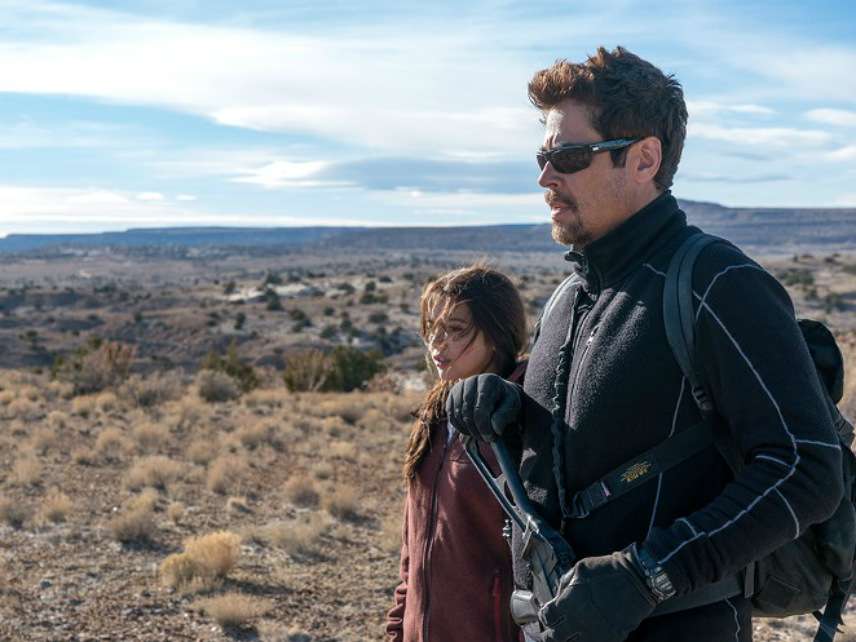Movie Review: Sicario: Day of the Soldado
Josh Brolin and Benicio Del Toro caught again in a vicious drug-war crossfire.

"I'm gonna have to get dirty," says walking human-rights violation Matt Graver (Josh Brolin), who you'll be happy to know is still the same cheery sadist we met three years ago in Sicario. Graver has been called back to Washington from Somalia, where he was happily tormenting captured pirates, and re-assigned by his arm's-length government handlers to start a fake drug war down in Mexico. The reason why this should need to be done isn't crystal clear – just to own the narcotraficantes, maybe—but the assignment is coming from the U.S. secretary of defense (Matthew Modine), and he has no objection to any dirty moves Graver may want to make. Happy to hear that, Graver flies off to Bogotá to reconnect with fellow hardass Alejandro Gillick (Benicio Del Toro), who is likewise much the same as he was in the first film, although possibly scarier. "No rules this time," Graver tells him. "I'm turning you loose." Just the words we want to hear.
Like Sicario, Day of the Soldado is a pretty great action movie. But it's more basic and quite a bit darker than its predecessor. Partly this is because the new film lacks the mediating humanism of Kate Macer, the FBI agent played by Emily Blunt in the first movie, who was appalled by the corruption and violence she saw oozing up as she sank deeper into the War on Drugs. Macer's absence from this picture gives Graver and Alejandro license to flick away whatever piddling ethical constraints might have hindered them previously and to get nonstop nasty. Which is fine with director Stefano Sollima, a blunt-force genre craftsman with little of the finesse of original director Denis Villeneuve. (Sollima knows his way around shredded flesh and bullet-stitched SUVs, but there's nothing in this movie to match the indelible horror of the family-massacre scene in Sicario, which derives its psychological power from Villeneuve's artful editing.)
The movie opens at night on the Tex-Mex border, where we see a group of illegal immigrants scattering across the desert, tracked by helicopter searchlights from above. When these terrified people are caught and rounded up, we see one of them stepping away from the others and fumbling with his clothing—and then triggering a bomb that lights up the darkness. This sudden suicide explosion is a first indication that the script (once again written by Taylor Sheridan) may initially have been headed in directions that were later abandoned. Why are we seeing Islamic prayer rugs spread out in the desert? Why must we make a side trip to Kansas City to witness a terrorist attack in a supermarket (with one of the victims crawling across the floor dragging the leaky stub of his severed leg behind)? The notion being toyed with here is that Islamic terrorists are crossing into the U.S. from Mexico. And Graver, when we first see him, in Somalia, has decided that the easily bribed local pirates have facilitated the jihadis' long journey.
But that's pretty much that. The terrorism motif is abruptly dropped when the action pivots to the border town of McAllen, Texas, where we meet a young Mexican-American kid named Miguel (Elijah Rodriguez), who is being lured into the underworld of the Mexican cartels, which we're told are currently making more money from trafficking desperate immigrants than from selling drugs. For a moment, the movie seems to be taking on the shape of the Steven Soderbergh film Traffic, which sought to explore the calamitous War on Drugs through the interlocked stories of people caught up in it. But there aren't enough stories to go around here: we do continue touching base with Miguel on and off, but we spend most of the rest of the movie with Graver and Alejandro—which is exactly where we want to be, of course.
These two have embarked on setting off a cartel war by kidnapping the bratty daughter (Isabela Moner) of a cartel jefe and trying to make the snatch look like the work of a rival outfit. This, as you might hope, involves shooting up an awful lot of stuff. The actual kidnapping, in Mexico City, is a slickly executed action set-piece, and as the movie roars along the director also proves himself adept at convoy attacks, Federale mow-downs, and occasional splattery head shots, some of them impressively jolting.
It makes sense that Alejandro should be drawn to protect the kidnapped girl—as you may recall, he has a dead daughter of his own in his backstory. But I wish that when he and the girl find themselves wandering in the desert in one scene, they wouldn't have to encounter a deaf farmer whose only function in the story is to demonstrate that Alejandro can converse in sign language. No, really. (Del Toro's trademark stillness and his embrace of silence are eloquently employed in this sequence, but it's still ludicrous.)
Sicario stood up perfectly well on its own, as you might remember—there was really no need for this sequel to be made. But here it is anyway, and the good news is that it's a sturdily wrought action item, as savage as you'd expect and quite a bit of fun, too (especially whenever Josh Brolin is demonstrating his gift for menacing, blustery bonhomie). Unfortunately, the picture starts flying off the rails at the point where one character is shot dead—definitively, irreversibly dead, it would seem—but then—miraculously, preposterously—comes back to life. The filmmakers will have to get such wacky stuff under control if they intend to squeeze another sequel out of this story—which, as the final scene loudly announces, they definitely do.


Show Comments (23)